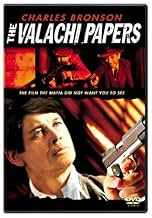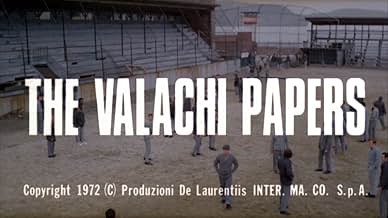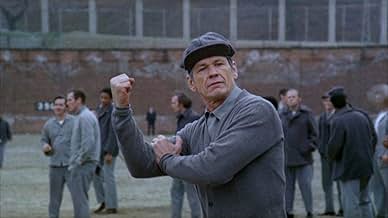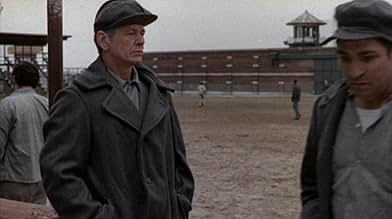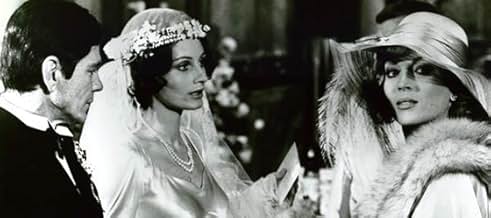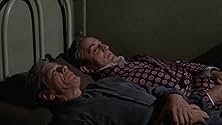CALIFICACIÓN DE IMDb
6.4/10
4.8 k
TU CALIFICACIÓN
El gángster Joe Valachi es un hombre marcado en el mismo lugar donde está encarcelado el jefe de la mafia Don Vito Genovese y se ve obligado a cooperar con el fiscal de distrito a cambio de ... Leer todoEl gángster Joe Valachi es un hombre marcado en el mismo lugar donde está encarcelado el jefe de la mafia Don Vito Genovese y se ve obligado a cooperar con el fiscal de distrito a cambio de protección.El gángster Joe Valachi es un hombre marcado en el mismo lugar donde está encarcelado el jefe de la mafia Don Vito Genovese y se ve obligado a cooperar con el fiscal de distrito a cambio de protección.
- Dirección
- Guionistas
- Elenco
Gerald S. O'Loughlin
- Ryan
- (as Gerald O'Loughlin)
Opiniones destacadas
Charles Bronson starts to break out of spaghetti westerns and good character roles and becomes a leading man around the time The Valachi Papers came out. It was a big milestone in his career, playing the most famous gangster stoolie of all.
It's not quite true that all Valachi's testimony managed to do was get a lot of high television ratings for some re-election hungry Senators. Not that they didn't get it and didn't appreciate the side benefits of those famous televised hearings, but eventually what came out of the Valachi hearings was the RICO law which has in fact put quite a dent into organized crime.
The Valachi Papers has Charles Bronson telling FBI man Gerald S. O'Loughlin about his life and times in organized crime with La Cosa Nostra from the days of the Marranzano-Masseria wars until the present which would have been 1962. He doesn't really tell anything new to them, basically he confirms what had been gangster legend about the circumstances of many a demise. But with some hard documentation now, new laws are created to meet the problem.
Bronson does his best with Valachi, but the story has him pretty one dimensional. It's far from The Godfather where you really get inside the characters of the fictional Corleone family. Bronson sure has no conscience about what he did and I'm sure the real Valachi didn't either. In fact the only reason he turns informer is that Vito Genovese already mistakenly has him down as one.
Fans of the gangster genre and Charles Bronson should give this one a look. Others should see The Godfather all three parts.
It's not quite true that all Valachi's testimony managed to do was get a lot of high television ratings for some re-election hungry Senators. Not that they didn't get it and didn't appreciate the side benefits of those famous televised hearings, but eventually what came out of the Valachi hearings was the RICO law which has in fact put quite a dent into organized crime.
The Valachi Papers has Charles Bronson telling FBI man Gerald S. O'Loughlin about his life and times in organized crime with La Cosa Nostra from the days of the Marranzano-Masseria wars until the present which would have been 1962. He doesn't really tell anything new to them, basically he confirms what had been gangster legend about the circumstances of many a demise. But with some hard documentation now, new laws are created to meet the problem.
Bronson does his best with Valachi, but the story has him pretty one dimensional. It's far from The Godfather where you really get inside the characters of the fictional Corleone family. Bronson sure has no conscience about what he did and I'm sure the real Valachi didn't either. In fact the only reason he turns informer is that Vito Genovese already mistakenly has him down as one.
Fans of the gangster genre and Charles Bronson should give this one a look. Others should see The Godfather all three parts.
I truly think if this film had come out earlier it would today be thought of as a better film. After all, it's FAR better than its current rating of 6.8. That's because 1972 was the same year that "The Godfather" debuted and the utter greatness of "The Godfather" probably overwhelmed "The Valachi Papers"---as both touch on very similar subject matter. The main difference is that "The Godfather" was based fictionalized characters and had a true elegance about the film. "The Valachi Papers" in contrast was a much more straight forward story based on real mob figures--and it's a dandy film.
The film begins in the early 1960s. Mobster Joseph Valachi is in prison and multiple attempts are made on his life. It seems that someone in the organization has talked--and the mob of bosses, Genovese (Lino Ventura) believes it was Valachi. And, not surprisingly, a contract has been placed on Valachi's head. This has the unintended consequence of forcing Valachi to to authorities. Almost all the rest of the film consists Valachi giving his story to the government agent. What follows is a very long story about Valachi's earliest days in the mob (about 1930) up to the arrest that brought him to prison--and a bit beyond.
The story is helped a lot by the films's length--a little over two hours. You'd need at least this much to tell such a long and complicated story. It also helps that Charles Bronson is given some excellent support. Among the many wonderful actors, one really surprised me--Lino Ventura. I've seen him in many French films (mostly Pierre Melville productions) and have LOVED his acting--he plays a great mobster--cold and tough. I never realized that he spoke English so well--everything I've seen him in up until now has been in French. Here, he very credibly plays an Italian-American! The script also was quite good. While not quite as human and interesting as "The Godfather", it sure was good...very, very good.
There's almost nothing negative I could say about the film other than very minor things. Bronson was too old for this role. When the film began he was supposed to be 27--but looked about twice that. Also, a few times anachronistic elements somehow made their way in--such as cars that were from the wrong time period. But, as I said, this is all very minor.Aside from this, a top quality production that deserves more recognition. Gritty, exciting and fascinating as well.
By the way, although IMDb lists the movie as being rated PG, the version I saw was way too bloody and filled with nudity to have been rated PG. The lesbian scene along would have merited a rating of R. Perhaps this was a director's cut or perhaps it was not rated PG or perhaps there were just multiple versions.
The film begins in the early 1960s. Mobster Joseph Valachi is in prison and multiple attempts are made on his life. It seems that someone in the organization has talked--and the mob of bosses, Genovese (Lino Ventura) believes it was Valachi. And, not surprisingly, a contract has been placed on Valachi's head. This has the unintended consequence of forcing Valachi to to authorities. Almost all the rest of the film consists Valachi giving his story to the government agent. What follows is a very long story about Valachi's earliest days in the mob (about 1930) up to the arrest that brought him to prison--and a bit beyond.
The story is helped a lot by the films's length--a little over two hours. You'd need at least this much to tell such a long and complicated story. It also helps that Charles Bronson is given some excellent support. Among the many wonderful actors, one really surprised me--Lino Ventura. I've seen him in many French films (mostly Pierre Melville productions) and have LOVED his acting--he plays a great mobster--cold and tough. I never realized that he spoke English so well--everything I've seen him in up until now has been in French. Here, he very credibly plays an Italian-American! The script also was quite good. While not quite as human and interesting as "The Godfather", it sure was good...very, very good.
There's almost nothing negative I could say about the film other than very minor things. Bronson was too old for this role. When the film began he was supposed to be 27--but looked about twice that. Also, a few times anachronistic elements somehow made their way in--such as cars that were from the wrong time period. But, as I said, this is all very minor.Aside from this, a top quality production that deserves more recognition. Gritty, exciting and fascinating as well.
By the way, although IMDb lists the movie as being rated PG, the version I saw was way too bloody and filled with nudity to have been rated PG. The lesbian scene along would have merited a rating of R. Perhaps this was a director's cut or perhaps it was not rated PG or perhaps there were just multiple versions.
This picture is plenty of mayhem , strong stuff , drama and amount of gangland violence . A biography heavily influenced by Valachi memoirs and by interviews was written by journalist Peter Maas and published in 1968 as The Valachi Papers, forming the basis for this film . The flick deals with tough Joe Valachi (Charles Bronson) , he has a price put on his head by Don Vito Genovese (Lino Ventura) who is in prison and from there, he still runs his criminal empire . An unsuccessful attempt to slit his throat puts him over the edge to die . Valachi must take desperate steps to protect himself while in prison. Because of the bounty on his head from his own, a federal agent named Ryan (Gerald O'Loughlin) convinces Valachi really to be a mob informant in return for safety inside . Valachi tells a story that starts in 1929, when he was first imprisoned in Sing Sing . Valachi's criminal career began with a small gang known as "The Minutemen," so-called for carrying out smash and grab burglaries and escaping within a minute and subsequently as a chauffeur.I n the early 1930s, through mob contact Dominick "The Gap" Petrilli (Walter Chiari) , Valachi was introduced to the Cosa Nostra or Mafia, and soon became a soldier in the Reina Family (now known as the Lucchese Family) during the height of the Castellammarese War. Valachi fought on the side of Salvatore Maranzano, who eventually defeated the faction headed by rival Joseph Masseria (Sperli) . After Masseria's murder, Valachi became a bodyguard for Maranzano. However, this position was short-lived, as Maranzano (Joseph Wiseman) himself was murdered in 1931. Valachi then became a soldier in the family headed by Charles "Lucky" Luciano (eventually known as the Genovese Family), in the crew headed by Anthony "Tony Bender" Strollo (Leontini) .
This landmark gangster movie is strong stuff , being dominated by the tenacious acting of Charles Bronson as the gangster of the title who follows his way venomously since a simple gangster , chauffeur until his prison as he breaks the sacred code of silence , the Omertá . Bronson captures the special excitement or mood of paranoia on Valachi role . Director Yerence Young's body-strewn look at the feud between Maranzano , Genovese , Masseria , Gaetano Reina , Lucky Luciano and other famous mobsters , but especially concerns about the informer Joe Valachi . This is a violence-ridden story full of action, drama, thriller , drama but being overlong . The notorious gangster Vito Genovese being splendidly played by Lino Ventura who makes a good character study of one of the most colorful mobsters of the history .In the film appears famous gangsters such as Salvatore Maranzano played by Joseph Wiseman , Gaetano Reina acted by Amedeo Nazzari , Albert Anastasia by Fausto Tozzi , Letizia Reina played by Pupella Maggio and Lucky Luciano performed by Angelo Infanti . Jill Ireland , Bronson's real wife , makes an appealing heroine , providing an elegant touch amid the 'macho'machine gun mayhem of the rest of the film .
The motion picture is based on the book ¨Joe Valachi papers¨ and on real events , these are the following : ¨In October 1963, Valachi had testified before Subcommittee on Investigations of the U.S. Senate Committee on Government Operations that the Mafia did exist.Although Valachi's disclosures never led directly to the prosecution of many Mafia leaders, he was able to provide many details of its history, operations and rituals, aiding in the solution of several uncleared murders, as well as naming many members and the major crime families. His testimony, which was broadcast on radio and television and published in newspapers, was devastating for the mob, still reeling from the November 14, 1957 Apalachin Meeting, where state police had accidentally discovered several Mafia bosses from all over the United States meeting at the Apalachin home of mobster Joseph Barbara. Following Valachi's testimony, the mob was no longer invisible to the public. He was the son-in-law of Gaetano Reina, having married Reina's oldest daughter Mildred over the objections of her mother, brother, and uncles. Valachi's motivations for becoming an informer have been the subject of some debate. Valachi claimed to be testifying as a public service and to expose a powerful criminal organization that he blamed for ruining his life, but it is also possible he was hoping for government protection as part of a plea bargain in which he was sentenced to life imprisonment, avoiding the death penalty for a murder he committed in prison on June 22, 1962. While in prison, Valachi feared that mob boss Vito Genovese had ordered his death as a traitor. Using a pipe left near some construction work, he bludgeoned to death an inmate whom he mistook for Joseph DiPalermo, a Mafia member he believed was commissioned to kill him. (Valachi and Genovese were both serving sentences for heroin trafficking. After time with FBI handlers, Valachi came forward with a story of Genovese giving him a kiss on the cheek, which he took as a "kiss of death". In 1966, Valachi attempted to hang himself in his prison cell, using an electrical extension cord. On April 3, 1971, Valachi died of a heart attack at Federal Correctional Institution, La Tuna in Texas, having outlived Vito Genovese by two years. The $100,000 bounty, placed on Valachi by Genovese, went uncollected.¨
This landmark gangster movie is strong stuff , being dominated by the tenacious acting of Charles Bronson as the gangster of the title who follows his way venomously since a simple gangster , chauffeur until his prison as he breaks the sacred code of silence , the Omertá . Bronson captures the special excitement or mood of paranoia on Valachi role . Director Yerence Young's body-strewn look at the feud between Maranzano , Genovese , Masseria , Gaetano Reina , Lucky Luciano and other famous mobsters , but especially concerns about the informer Joe Valachi . This is a violence-ridden story full of action, drama, thriller , drama but being overlong . The notorious gangster Vito Genovese being splendidly played by Lino Ventura who makes a good character study of one of the most colorful mobsters of the history .In the film appears famous gangsters such as Salvatore Maranzano played by Joseph Wiseman , Gaetano Reina acted by Amedeo Nazzari , Albert Anastasia by Fausto Tozzi , Letizia Reina played by Pupella Maggio and Lucky Luciano performed by Angelo Infanti . Jill Ireland , Bronson's real wife , makes an appealing heroine , providing an elegant touch amid the 'macho'machine gun mayhem of the rest of the film .
The motion picture is based on the book ¨Joe Valachi papers¨ and on real events , these are the following : ¨In October 1963, Valachi had testified before Subcommittee on Investigations of the U.S. Senate Committee on Government Operations that the Mafia did exist.Although Valachi's disclosures never led directly to the prosecution of many Mafia leaders, he was able to provide many details of its history, operations and rituals, aiding in the solution of several uncleared murders, as well as naming many members and the major crime families. His testimony, which was broadcast on radio and television and published in newspapers, was devastating for the mob, still reeling from the November 14, 1957 Apalachin Meeting, where state police had accidentally discovered several Mafia bosses from all over the United States meeting at the Apalachin home of mobster Joseph Barbara. Following Valachi's testimony, the mob was no longer invisible to the public. He was the son-in-law of Gaetano Reina, having married Reina's oldest daughter Mildred over the objections of her mother, brother, and uncles. Valachi's motivations for becoming an informer have been the subject of some debate. Valachi claimed to be testifying as a public service and to expose a powerful criminal organization that he blamed for ruining his life, but it is also possible he was hoping for government protection as part of a plea bargain in which he was sentenced to life imprisonment, avoiding the death penalty for a murder he committed in prison on June 22, 1962. While in prison, Valachi feared that mob boss Vito Genovese had ordered his death as a traitor. Using a pipe left near some construction work, he bludgeoned to death an inmate whom he mistook for Joseph DiPalermo, a Mafia member he believed was commissioned to kill him. (Valachi and Genovese were both serving sentences for heroin trafficking. After time with FBI handlers, Valachi came forward with a story of Genovese giving him a kiss on the cheek, which he took as a "kiss of death". In 1966, Valachi attempted to hang himself in his prison cell, using an electrical extension cord. On April 3, 1971, Valachi died of a heart attack at Federal Correctional Institution, La Tuna in Texas, having outlived Vito Genovese by two years. The $100,000 bounty, placed on Valachi by Genovese, went uncollected.¨
I give this a 7 stars because it was made the same year as Godfather I, so it didn't benefit from all the film-industry wisdom that followed that production. Rather, this is a character study of one mafioso, which is a separate issue from the operatic, all-systems-GO no-holds-barred approach Coppola was able to employ in The Godfather. it's a smaller film, and should be compared to, say, Mobsters (1991), which deals with the same period and some of the same characters as V.P. Charles Bronson's Valachi is adequate. He's a workaday, uneducated, down- home mob guy, and Bronson plays him as if he were Polish, with a job that he goes to every day, where everyone talks Italian. Because it is through his eyes that we see his world, some of the other characters become more vivid, e.g., Joseph Wiseman as Salvatore Maranzano. When I compare the casting of the incomparable Joseph Wiseman in this role as opposed to, say, Michael Gambon in the same role in Mobsters, or Anthony Quinn as an equally old-school rival in the same film, I wonder: None of these actors are Italian -American or even simply Italian; why do some of them work, and the others don't? Granted that Wiseman, Quinn and Gambon are all consummate professionals and true craftsmen as actors, if anyone mentions Salvatore Maranzano and the Castellammarese gang war of 1929, the face that will come to my mind is that of Joseph Wiseman. He and Charles Bronson make this film worth seeing.
America has always been a land of opportunity. For the Italians, none more so than giving rise to an American icon, the Gangster. For many years, the U.S. government denied the existence of Organized crime. Even the top U.S. law enforcement officer and head of the famed Federal Bureau of Investigation, J.Edgar Hoover, denied such an organization existed. His apathy was due in part to his own shadowy complicity with the Giancana crime family. That's pretty much how it stayed until the advent of the McClellen commission. The movie " The Valachi Papers " is the direct result of that investigation and brought to the forefront of public awareness the vast network of the underworld's crime bosses and their families. The wellspring of that knowledge was none other than the most famous gangster since Al Capone, one, Joseph Valachi. His testimony, created a healthy respect and awe for the Mafia or as Valachi termed it, La Cosa Nostra. (Our thing) This movie is a compilation of his criminal life, dastardly deeds and the revelation of some of the nation's most notable names. Men like Vito Genovese, Anastasia, 'Lucky Luciano' Don Masseria and Marazano. The film is honest when it deals with its legendary brutality and bodies are left throughout the story including its most graphic moments. The end result is perhaps the best Mafia movie since the Godfather. ****
¿Sabías que…?
- TriviaIn return for using the penitentiary grounds of the Sing Sing Correctional Facility, the production made a large contribution to the prison's recreation fund.
- ErroresDuring the chase scene which takes place during the 1920s in New York, a car goes into the river and in the background the twin towers of the World Trade Center under construction can be clearly seen. This is one of the most famous period reconstruction mistakes in film history.
- Citas
Tony Bender: "Cut it off!" Bender to his two henchman as they grab Gap to get a "present" for Don Vito's girlfriend.
- Versiones alternativasTo receive an 'X' certificate the UK cinema version received heavy cuts to scenes of violence including the castration scene, bloody shootings, and the meat hook killing. Video and DVD releases restore the cuts.
- ConexionesFeatured in Valachi: The Violent Era (1972)
Selecciones populares
Inicia sesión para calificar y agrega a la lista de videos para obtener recomendaciones personalizadas
- How long is The Valachi Papers?Con tecnología de Alexa
Detalles
- Fecha de lanzamiento
- Países de origen
- Idiomas
- También se conoce como
- Die Valachi-Papiere
- Locaciones de filmación
- Productoras
- Ver más créditos de la compañía en IMDbPro
Taquilla
- Presupuesto
- USD 5,000,000 (estimado)
- Tiempo de ejecución1 hora 50 minutos
- Color
- Relación de aspecto
- 1.85 : 1
Contribuir a esta página
Sugiere una edición o agrega el contenido que falta

Principales brechas de datos
By what name was The Valachi Papers (1972) officially released in India in English?
Responda

